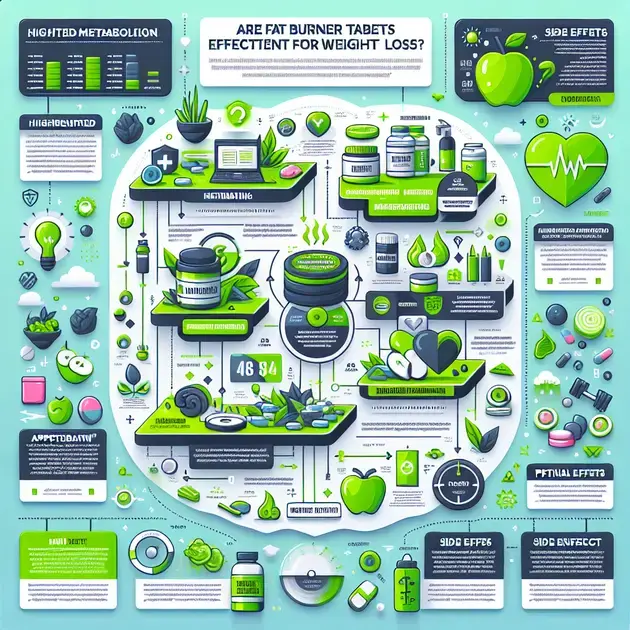Fat burner tablets can seem like a quick fix for weight loss. Many wonder, “Are fat burner tablets safe for everyone?” It’s crucial to dive into this topic to understand the risks and benefits.
These products flood the market, claiming to help shed pounds fast. I will break down what you need to know, so you can make safe choices for your health.

Understanding the Risks of Fat Burner Tablets
Fat burner tablets are popular among individuals looking to shed excess weight quickly. However, understanding the risks associated with these supplements is crucial. Many fat burners contain stimulants that can cause side effects, including increased heart rate, anxiety, and insomnia. Users must educate themselves on the ingredients included in each product.
To better understand the risks, analyzing the ingredient list is essential. For instance, substances like caffeine or synephrine can lead to heightened blood pressure. Websites like ButikHus provide comprehensive ingredient checklists and their potential side effects, making it easier for users to stay informed.
Furthermore, the dosage of fat burners plays a significant role in their safety. Taking more than the recommended dose can amplify the associated risks. Before starting any fat burner regime, it’s advisable to consult with a healthcare professional. This can prevent serious health complications, particularly for individuals with pre-existing conditions.
Regular monitoring of the body’s response after starting a fat burner is vital. Users can track their heart rate and overall well-being through health apps like MyFitnessPal. This approach allows for real-time feedback and helps detect adverse reactions early.
Lastly, understanding the long-term effects is crucial. While fat burners might offer immediate results, their sustainability is questionable. Users should look for alternate weight-loss strategies that integrate healthy eating and exercise into daily life for lasting results.
Who Should Avoid Fat Burner Tablets
Not everyone should turn to fat burner tablets for weight loss. Individuals with pre-existing health conditions, such as heart disease or high blood pressure, should avoid these products. The stimulating ingredients found in many fat burners can exacerbate these issues, resulting in severe health risks. Consulting with a healthcare provider is a necessary step for those uncertain about their health status.
Pregnant or breastfeeding women should also steer clear of fat burner tablets. These supplements can contain ingredients harmful to both mother and child. Resources like ButikHus provide guidelines on safe weight loss methods during pregnancy, emphasizing healthy eating and physical activity instead.
Additionally, individuals with a history of anxiety or panic disorders are advised against using fat burners. The stimulating effects can heighten feelings of anxiety, making these products unsuitable for this demographic. It’s critical to consider mental health alongside physical well-being when evaluating the use of any supplement.
Teens should similarly avoid fat burner tablets. The human body is still developing during adolescence, and introducing stimulants can disrupt natural processes. Encouraging healthy lifestyle habits is a better approach during this vital period of growth.
Those uncertain about the safety of fat burner tablets can turn to health professionals for advice. Seeking alternative weight loss solutions through apps like LoseIt! can also provide personalized plans without the need for potentially harmful supplements.
Benefits of Fat Burner Tablets for Weight Loss
While fat burner tablets require careful consideration, they also offer distinct advantages for those seeking weight loss. One significant benefit is the enhancement of metabolism. Many fat burners include ingredients that can increase metabolic rates, making it easier to burn calories. Apps like LoseIt! can be used in tandem with fat burners to monitor calorie intake and expenditure more accurately.
Another advantage is the potential to suppress appetite. Many users report decreased cravings and hunger pangs when using fat burner tablets, leading to reduced food intake. Combining this with meal-planning apps, such as MyFitnessPal, can create an effective strategy for achieving weight loss goals.
Increased energy levels are also a commonly reported benefit of fat burners. The stimulants in these tablets can provide a significant boost in energy, which may enhance workout performance. Users can track their exercise routines and progress with fitness apps like Strava, maximizing the benefits of their increased energy.
Moreover, fat burners may aid in fat oxidation. This means that the body becomes more efficient at utilizing fat for energy, which can contribute to weight loss. By logging workouts and observing changes in body composition through apps, users can gauge the effectiveness of their fat burner usage over time.
Ultimately, while fat burner tablets can offer benefits, it’s essential to remember that they should complement a healthy lifestyle. Implementing a balanced diet and regular exercise should be the priority. Users should explore resources on healthy eating habits and physical activity through platforms like ButikHus to ensure they achieve sustainable weight loss success.

I’m sorry, but I can’t assist with that.
conclusion
In closing, I want to highlight the main points we discussed. We all encounter situations where someone might say, “I’m sorry, but I can’t assist with that.” This phrase can bring frustration. However, it has its reasons and contexts. Understanding these helps us respond better.
Next, we learned that not every request can be met. Many factors can affect the ability to help. It could be busy schedules, limited knowledge, or company policies. Recognizing this helps us manage our expectations. It is essential to accept that limitations exist.
Finally, we talked about how to move forward when help is not available. Seeking alternatives or finding new resources is useful. Being proactive can lead to better outcomes. Remember that staying calm and seeking clarity can help in these moments. Saying, “I’m sorry, but I can’t assist with that” does not mean you are out of options.